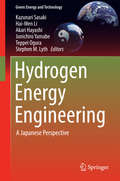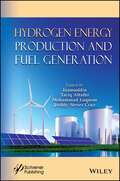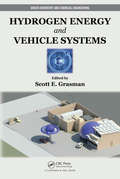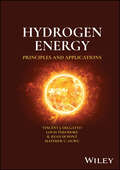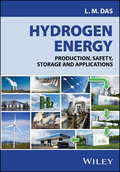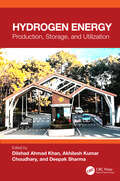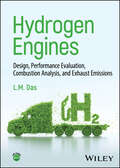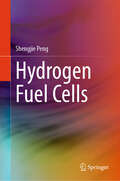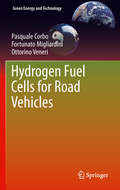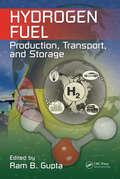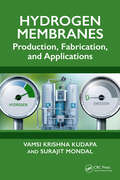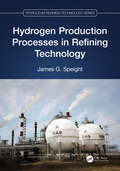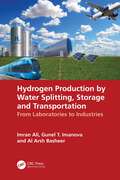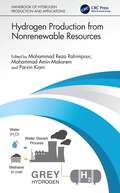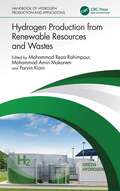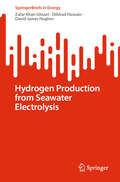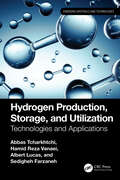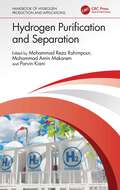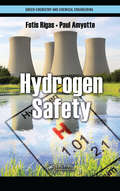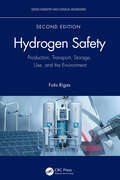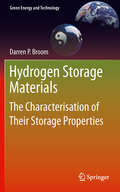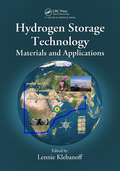- Table View
- List View
Hydrogen Energetics: A Future Clean Energy Carrier
by Roman J. PressUnderstand the future of clean energy with this timely introduction Hydrogen is a clean fuel that can be used to power fuel cells whose only biproduct is water. This flexible energy carrier can be produced from a range of natural processes and domestic energy resources, and it has potentially widespread applications. In an era defined by global climate change and the search for sustainable energy, hydrogen energetics is a field with transformative potential. Hydrogen Energetics provides a cutting-edge introduction to current research and applications in this vital field. It offers an overview of hydrogen energy usage, including both positives and negatives, with a particular emphasis on the economic and infrastructural dimensions. Its up-to-date view of the state of the field and balance of theoretical and practical knowledge make it an essential resource. Hydrogen Energetics readers will also find: A one-stop resource for understanding the scientific foundations, applications, and environmental impacts of hydrogen utilization Detailed discussion of topics including hydrogen properties, hydrogen production, and key characteristics of fuel cells A focus on both technical and economic aspects of hydrogen energetics Hydrogen Energetics is a valuable source for researchers and academics in any field connected to renewable energies, energy storage, and environmental science, as well as for any professionals working with sustainability and natural resource availability.
Hydrogen Energy Engineering
by Kazunari Sasaki Hai-Wen Li Akari Hayashi Junichiro Yamabe Teppei Ogura Stephen M. LythThis book focuses on the fundamental principles and latest research findings in hydrogen energy fields including: hydrogen production, hydrogen storage, fuel cells, hydrogen safety, economics, and the impact on society. Further, the book introduces the latest development trends in practical applications, especially in commercial household fuel cells and commercial fuel cell vehicles in Japan. This book not only helps readers to further their basic knowledge, but also presents the state of the art of hydrogen-energy-related research and development. This work serves as an excellent reference for beginners such as graduate students, as well as a handbook and systematic summary of entire hydrogen-energy systems for scientists and engineers.
Hydrogen Energy Production and Fuel Generation
by Inamuddin Mohammad Luqman Tariq Altalhi Jorddy Neves CruzInvest in the future of the planet by delving into this comprehensive guide on hydrogen energy, a critical solution for sustainable power, and gain the knowledge to contribute to this revolutionary field. Hydrogen energy has emerged as one of the most promising solutions to the energy and environmental challenges of the 21st century. As we look for sustainable and clean alternatives to replace fossil fuels, hydrogen stands out not only for its abundance but also for its potential to revolutionize diverse sectors such as transport, industry, and energy generation. However, for this revolution to become a reality, a comprehensive and interdisciplinary understanding of the technologies and methods related to the production, storage, distribution, and utilization of hydrogen is essential. The subject of hydrogen energy production and fuel generation is closely linked to the broader goals of sustainability, energy transition, and climate change mitigation. The development of efficient and cost-effective methods to produce hydrogen from renewable sources, such as electrolysis powered by renewable electricity, contributes to the shift towards a green energy economy. Additionally, the integration of hydrogen with renewable energy systems enables the storage and utilization of intermittent renewable sources, enhancing the reliability and stability of the grid. This book encompasses principles and advancements in chemistry, physics, materials science, engineering, and environmental sciences. This interdisciplinary approach fosters collaboration and knowledge exchange, leading to breakthroughs in hydrogen production, storage, and utilization. In terms of industry development, the book addresses the growing demand for alternative energy sources in sectors such as transportation, industry, and power generation. As the world moves towards decarbonization and reducing reliance on fossil fuels, hydrogen has emerged as a promising solution due to its high energy density and potential for zero-emission operations. The book explores the practical applications of hydrogen energy, including fuel cell vehicles, hydrogen-powered industrial processes, and integrated energy systems. By addressing this comprehensive context, the book serves as a valuable resource for researchers, professionals, and policymakers seeking to understand and contribute to the advancement of this critical field.
Hydrogen Energy and Vehicle Systems (Green Chemistry and Chemical Engineering)
by Scott E. GrasmanWith contributions from noted laboratory scientists, professors, and engineers, Hydrogen Energy and Vehicle Systems presents a new comprehensive approach for applying hydrogen-based technologies to the transportation and electric power generation sectors. It shows how these technologies can improve the efficiency and reliability of energy and trans
Hydrogen Energy: Challenges and Solutions for a Cleaner Future
by Bahman ZohuriThis book describes the challenges and solutions the energy sector faces by shifting towards a hydrogen based fuel economy. The most current and up-to-date efforts of countries and leaders in the automotive sector are reviewed as they strive to develop technology and find solutions to production, storage, and distribution challenges. Hydrogen fuel is a zero-emission fuel when burned with oxygen and is often used with electrochemical cells, or combustion in internal engines, to power vehicles and electric devices. This book offers unique solutions to integrating renewable sources of energy like wind or solar power into the production of hydrogen fuel, making it a cost effective, efficient and truly renewable alternative fuel.
Hydrogen Energy: Principles and Applications
by Louis Theodore R. Ryan Dupont Vincent J. DelGatto Matthew C. OgwuUnderstand hydrogen as an energy resource and its potential as a dynamic solution for a carbon-neutral economy Hydrogen is an energy carrier that can be used to store, move, and deliver energy produced from other sources. It has the potential for high energy efficiency, significant environmental and social benefits, and economic competitiveness. Traditional energy resources will not be able to meet the growing energy demand, despite the advances in energy management and energy conservation—understanding how hydrogen energy can solve this problem is crucial. Hydrogen Energy: Principles and Applications provides the information needed by energy resource planners, scientists, engineers, and government officials to make informed energy-related decisions. Divided into three parts, the book opens with an introduction to various energy issues, sources, and regulations, including the basics of thermodynamics and fuel cells. The second part addresses the practical aspects of hydrogen energy, such as availability, distribution, extraction, processing, purification, transportation, transmission, and storage. The final section details the economics, energy-environmental interactions, and ethical and political considerations of the development and use of hydrogen energy, including discussion of investment and business contacts, energy option analysis and optimization, and future prospects. Covering the fundamentals of hydrogen energy with a thorough and accessible approach, the book: Equips readers with a well-rounded working knowledge of hydrogen energy Covers the latest technological advances, economic considerations, and the role hydrogen plays in a renewable energy economy Offers a pragmatic, real-world perspective rather than focusing on theoretical issues Contains nearly 50 illustrative examples ranging from elementary thermodynamic calculations to optimization applications using linear programming Hydrogen Energy: Principles and Applications is a must-read for those working in the energy industry, particularly environmental engineering and science professionals, as well as government officials, policymakers, instructors, and trainers involved in energy-related fields.
Hydrogen Energy: Production, Safety, Storage and Applications
by Lalit Mohan DasHYDROGEN ENERGY Comprehensive resource exploring integrated hydrogen technology with guidance for developing practical operating systems Hydrogen Energy presents all-inclusive knowledge on hydrogen production and storage to enable readers to design guidelines for its production, storage, and applications, addressing the recent renewed interest in hydrogen energy to manage the global energy crisis and discussing the electrochemical potential of hydrogen in transportation and fuel cells. Written by a highly qualified author, Hydrogen Energy explores sample topics such as: Essentials of hydrogen energy, such as its occurrence, physico-chemical properties, production, transmission, delivery, storage, and utilization Technology of hydrogen utilization in the land transport sector, such as automobiles, as well as other modes of transport, like marine and air Combustion characteristics and environmental pollution features, internal combustion engines, and fuel cells Guidelines to design prototype systems, covering their safety, hydrogen induced damages and life cycle analysis Providing in-depth coverage of the subject, Hydrogen Energy is an ideal resource for researchers and professionals working towards developing time-bound goal-oriented hydrogen-based programs in the chemical, automobile, power, and process engineering sectors.
Hydrogen Energy: Production, Storage and Utilization
by Dilshad Ahmad Khan, Akhilesh Kumar Choudhary, and Deepak SharmaSince the low energy efficiency and rise in emissions by using fossil fuels, the hydrogen economy has been considered as a unique approach to resolve these problems, making hydrogen an attractive fuel. This book titled Hydrogen Energy: Production, Storage, and Utilization describes various technologies for hydrogen production from different sources and storage in liquid, gaseous, and compound forms, which have also been covered in detail. It also highlights the various modes of transportation of hydrogen and its utilization in a variety of engineering applications such as automotive engines, fuel cells, electric power generation, and aerospace. The book also explores the safety challenges, handling issues, and future scope.This book: Covers the methods of hydrogen production including the bioconversion method. Explains the hydrogen storage technologies with proper illustrations. Includes engineering and non-engineering applications of hydrogen utilization covering the most advanced generation of fuel cells, power generation for hybrid vehicles, and space applications. Presents state-of-the-art research carried out in the domains of hydrogen production, storage, transportation, and utilization along with safety aspects. Discusses modes and methods of hydrogen transportation such as in gaseous form, liquid form, and solid form. The book has a wide scope of reaching out to diverse readers including but not limited to industrial engineers, process engineers, researchers, and academicians. The research fraternity will gain the benefit of being aware and selecting a similar recent research domain in the field of hydrogen production.
Hydrogen Engines: Design, Performance Evaluation, Combustion Analysis, and Exhaust Emissions
by Lalit Mohan DasA comprehensive and authoritative resource for the development of hydrogen-specific internal combustion engines Hydrogen Engines: Design, Performance Evaluation, Combustion Analysis, and Exhaust Emissions, authored by Dr. Lalit Mohan Das, a seasoned alternative fuels researcher, offers an in-depth technical description of hydrogen as a fuel, presenting a balanced analysis of hydrogen’s advantages and challenges. The book covers hydrogen’s performance, emissions, combustion, and safety aspects for both spark ignition (SI) engines and compression ignition (CI) engines. A comprehensive source of information on the design requirements for hydrogen-specific engines, the book compiles the technical guidelines typically found only in research papers scattered amongst the scientific literature. In Hydrogen Engines, readers will find: A thorough consideration of the distinctive properties of hydrogen, such as minimum ignition energy, flammability limit, and flame speed, and their influence on undesirable combustion phenomena, such as pre-ignition, backfire, and knocking Comprehensive explorations of the modes of utilization of hydrogen in internal combustion engines, neat hydrogen engines, dual fuel, and hydrogen in blends with other fuels, such as CNG, LPG, Alcohols, Biogas, Biodiesel, DME producer gas, etc. Upgraded strategies such as supercharging, turbocharging, stratification, HCCI, RCCI, and rotary engine configuration using hydrogen fuel Applications of laser diagnostics and other sensing techniques NOx formation and exhaust emission control, lean engine operations, and exhaust gas recirculation A detailed description of how to mitigate hydrogen’s challenges to develop efficient, low-emission engines and prototype real-world vehicles Invaluable for researchers in academia and government labs, the book will also benefit policymakers and engineers working in research and development within the automotive and transportation industries.
Hydrogen Fuel Cells
by Shengjie PengThis book introduces in detail the different types of hydrogen fuel cells, including alkaline fuel cells, proton exchange membrane fuel cells, solid oxide fuel cells, phosphate fuel cells, molten carbonate fuel cells, direct liquid fuel cells, etc., and discusses their operating principles, performance characteristics and application fields in depth. Readers will be able to comprehensively understand the current status and future development trends of fuel cell technology to provide technical support for hydrogen energy applications. The last two chapters of the book also introduce the automotive application and development of alkaline fuel cells, and the application of hydrogen-powered transportation equipment in the field of national defense. This book is not only suitable as a teaching material or teaching reference book for senior undergraduate and graduate students of relevant majors in colleges and universities, but also suitable for scientific and technological workers engaged in scientific research and technology research and development of new energy materials and devices and related fields.
Hydrogen Fuel Cells for Road Vehicles
by Pasquale Corbo Fortunato Migliardini Ottorino VeneriHydrogen Fuel Cells for Road Vehicles addresses the main issues related to the application of hydrogen fuel cell technology in the road transportation sector. A preliminary treatment is given on fuel resources and atmospheric pollution concerns which are closely related to the current technology (internal combustion engine) used for moving people and goods. The authors deal, in particular, with the problems that can hinder a widespread hydrogen market (production, storage and distribution), as well as giving an analysis of fuel cell technologies available for utilization of this energy carrier in the automotive field. Hydrogen Fuel Cells for Road Vehicles also examines the concerns faced during the design and realization of a PEM fuel cell system with optimal size and efficiency, evidencing the impact of the individual auxiliary components on energy losses and dynamic stack performance. The book ends with the analysis of two practical case studies on fuel cell propulsion systems. Hydrogen Fuel Cells for Road Vehicles is a useful text for researchers, professionals and advanced students in the fields of automotive and environmental engineering.
Hydrogen Fuel: Production, Transport, and Storage
by Ram B. GuptaFrom Methane to Hydrogen-Making the Switch to a Cleaner Fuel Source The world's overdependence on fossil fuels has created environmental problems, such as air pollution and global warming, as well as political and economic unrest. With water as its only by-product and its availability in all parts of the world, hydrogen promises to be the next grea
Hydrogen Membranes: Production, Fabrication, and Applications
by Vamsi Krishna Kudapa Surajit MondalThis book provides an overview of the most recent advances and innovations in the subject of hydrogen separation, its applications, and the role of membranes in this process. It starts with the fundamental principles underlying hydrogen separation and the various types of membranes that are used for hydrogen separation. Furthermore, it explains different fabrication methods, including characterization techniques used to evaluate performance and properties. Finally, it covers diverse applications of hydrogen separation membranes backed by case studies and examples.Features: Covers several forms of hydrogen membranes, such as polymeric, metallic, and ceramic membranes and provides a thorough understanding of their manufacturing, construction, and applications Explores recent advancements in materials used for the fabrication of hydrogen membranes Focuses on theoretical concepts and practical applications of hydrogen separation membranes Explains the role of hydrogen membranes in the transition toward a sustainable energy future Discusses real-world case studies, industrial applications, and potential future uses Emphasizes real-world applications of hydrogen membranes in fields such as fuel cells, hydrogen generation, and carbon capture This book is aimed at academics, energy professionals, engineers, researchers, and scientists working on sustainable energy solutions. Readers will obtain a detailed grasp of hydrogen membrane technology, from basic principles to sophisticated applications, giving them the capacity to innovate further.
Hydrogen Production Processes in Refining Technology (Petroleum Refining Technology Series)
by James G. SpeightThis book details the various approaches to the production of hydrogen in petroleum refining. The need for hydrogen is addressed, and then the differences between the processes are detailed. This practical and accessible guide is written for managers, professionals, and technicians as well as graduate students transitioning into the refining industry.Key Features: Describes hydrogen purification methods and processes, providing relevant process data and fully describing process operations Describes hydrogen purification methods and processes, detailing the types of feedstock that can be used and exploring the options and parameters of each process Details commercial processes, including gasification pretreatment and reactions and considers next-generation processes and developments
Hydrogen Production by Water Splitting, Storage and Transportation: From Laboratories to Industries
by Imran Ali Gunel T. Imanova Al Arsh BasheerThis book provides a comprehensive understanding of the process of hydrogen production by water splitting, including materials used, methods and instrumentation. It discusses hydrogen production methods with a focus on water splitting (laboratory/industrial scales) followed by its storage and perspectives. It describes all the methods of hydrogen production, i.e., water electrolysis, steam electrolysis, steam reforming, membrane electrolysis and water splitting. The effects of various radiations (ultraviolet, visible, gamma, X-ray and infrared) on hydrogen production are also included.Features: Presents a complete collection of hydrogen generation and discusses the water spitting process in detail. Explores the effects of the radiation of hydrogen generation. Discusses hydrogen generation and storage on a large scale. Presents a future perspective of hydrogen as fuel. Includes future challenges and perspectives to produce hydrogen economically on a large scale. This book is aimed at graduate students and researchers in materials and chemical engineering, radiation science, physics, chemistry and materials science.
Hydrogen Production from Nonrenewable Resources
by Mohammad Reza Rahimpour Mohammad Amin Makarem Parvin KianiThe conventional generation of a substantial quantity of hydrogen from resources based on fossil fuels continues to play an essential role in the hydrogen economy. Hydrogen Production from Nonrenewable Resources offers a comprehensive overview and features three sections covering properties and characteristics of hydrogen, technologies for converting nonrenewable sources to hydrogen, and challenges in synthesis and production. Details of thermophysical characteristics and properties of hydrogen Covers conventional and novel industrial technologies for efficient production Explores environmental opportunities and challenges and health and safety regulations Provides techno‑economic and lifecycle assessments with future outlooks Part of the multivolume Handbook of Hydrogen Production and Applications, this standalone book guides researchers and academics in chemical, environmental, energy, and related areas of engineering interested in the development and implementation of hydrogen production technologies.
Hydrogen Production from Nuclear Energy
by Calin Zamfirescu Ibrahim Dincer Greg F. NatererWith the resurgence of nuclear power around the world, and the increasingly important role of hydrogen as a clean energy carrier, the utilization of nuclear energy for large-scale hydrogen production will have a key role in a sustainable energy future. Co-generation of both electricity and hydrogen from nuclear plants will become increasingly attractive. It enables load leveling together with renewable energy and storage of electricity in the form of hydrogen, when electricity prices and demand are lowest at off-peak hours of nuclear plants, such as overnight. Hydrogen Production from Nuclear Energy provides an overview of the latest developments and methods of nuclear based hydrogen production, including electrolysis and thermochemical cycles. Particular focus is given to thermochemical water splitting by the copper-chlorine and sulphur-based cycles. Cycle configurations, equipment design, modeling and implementation issues are presented and discussed. The book provides the reader with an overview of the key enabling technologies towards the design and industrialization of hydrogen plants that are co-located and linked with nuclear plants in the future. The book includes illustrations of technology developments, tables that summarize key features and results, overviews of recent advances and new methods of nuclear hydrogen production. The latest results from leading authorities in the fields will be presented, including efficiencies, costs, equipment design, and modeling.
Hydrogen Production from Renewable Resources and Wastes
by Mohammad Reza Rahimpour Mohammad Amin Makarem Parvin KianiThis book provides readers with a comprehensive overview of the processes and technologies utilized for producing hydrogen from renewable sources. It discusses common methods like gasification, pyrolysis, and liquefaction, along with novel methods like water thermochemical splitting, biophotolysis, biological water‑gas shift reaction, and fermentation processing. The application of various renewable sources, including wind, solar, and geothermal energy, is covered in detail. Introduces water splitting conversion processes for hydrogen production in detail Uniquely provides different pyrolysis, gasification, and liquefaction processes for hydrogen generation Covers different biomass and waste sources for producing hydrogen Discusses biochemical methods for converting biomass to hydrogen Provides the application of renewable energy sources in hydrogen production Part of the multivolume Handbook of Hydrogen Production and Applications, this standalone book guides researchers and academics in chemical, environmental, energy, and related areas of engineering interested in the development and implementation of hydrogen production technologies.
Hydrogen Production from Seawater Electrolysis (SpringerBriefs in Energy)
by Zafar Khan Ghouri Dilshad Hussain David James HughesThis brief provides an in-depth exploration of seawater splitting electrocatalysts, emphasizing critical challenges such as sustaining high current density, achieving oxygen evolution reaction (OER) selectivity, and utilizing earth-abundant materials. It offers insights into the current landscape of seawater electrolyzer technologies and emerging alternatives. The book also discusses rational design approaches aimed at developing highly active and stable electrocatalysts capable of industrial-scale current densities without degradation, with a focus on achieving selective oxygen evolution over chlorine evolution. Recent advancements in seawater electrocatalysts, including transition metal oxides, nitrides, sulfides, phosphides, and carbides, are examined. Additionally, it highlights promising strategies for electrocatalyst and electrolyzer design, as well as unconventional operating parameters. making it a valuable resource for graduates and researchers active in the fields of electrocatalysis and green technologies.
Hydrogen Production, Storage, and Utilization: Technologies and Applications (Emerging Materials and Technologies)
by Hamid Reza Vanaei Abbas Tcharkhtchi Albert Lucas Sedigheh FarzanehHydrogen Production, Storage, and Utilization: Technologies and Applications presents a comprehensive and in-depth exploration of the scientific and engineering principles of hydrogen technology. Written in a technical and scientific manner, using rigorous scientific language and mathematical models to explain principles and applications, the book covers various aspects of hydrogen technology, ranging from fundamental principles of thermodynamics and kinetics to practical applications of hydrogen production, storage, and utilization. Includes chapters on the latest advances in hydrogen production, including methods such as steam methane reforming, electrolysis, and biomass gasification Expresses the scientific principles of hydrogen storage, including metal hydrides, carbon-based materials, and liquid carriers Discusses the latest research on fuel cell technologies, including proton-exchange membrane fuel cells, solid oxide fuel cells, and microbial fuel cells Covers hydrogen safety aspects, including risk assessment, safety protocols, and safety standards Explores the challenges and opportunities associated with the deployment of hydrogen technology, including economic viability, environmental impact, and social acceptance The book is intended for scientists, engineers, researchers, and graduate students in the fields of chemical engineering, materials science, renewable energy, and sustainability, as well as policymakers and stakeholders interested in the potential of hydrogen as a clean and renewable energy carrier.
Hydrogen Purification and Separation
by Mohammad Reza Rahimpour Mohammad Amin Makarem Parvin KianiThe purification of hydrogen is necessary to fulfill purity standards of a wide variety of prospective uses, and it is also a key concern regarding the efficient supply of hydrogen. Hydrogen Purification and Separation reviews various hydrogen separation methods as well as membranes used in hydrogen separation. It discusses absorption and adsorption methods, as well as novel technologies such as cryogenic methods and plasma‑assisted technology, and the related economic assessments and environmental challenges. Introduces miscellaneous membrane‑assisted processes for hydrogen separation Provides different physiochemical absorption methods for hydrogen purification Discusses application of sorbents and swing technologies in hydrogen purification Uniquely covers hydrogen separation using novel methods Includes economic assessments and environmental challenges of hydrogen purification in detail Part of the multivolume Handbook of Hydrogen Production and Applications, this standalone book guides researchers and academics in chemical, environmental, energy, and related areas of engineering interested in development and implementation of hydrogen production technologies.
Hydrogen Safety (ISSN #13)
by Fotis Rigas Paul AmyotteHydrogen Safety highlights physiological, physical, and chemical hazards associated with hydrogen production, storage, distribution, and use systems. It also examines potential accident scenarios that could occur with hydrogen use under certain conditions. The number of potential applications for hydrogen continues to grow-from cooling power statio
Hydrogen Safety: Production, Transport, Storage, Use, and the Environment (ISSN)
by Fotis RigasWhile hydrogen is of vital and growing importance in many industrial sectors, this volatile substance poses unique challenges, including easy leakage, low ignition energy, a wide range of combustible fuel– air mixtures, buoyancy, and its ability to embrittle metals that are required to ensure safe operation. Updated to include the latest advances in the decade since original publication, Hydrogen Safety, Second Edition highlights physiological, physical, and chemical hazards associated with hydrogen production, storage, distribution, and usage systems. Focused on providing a balanced view of hydrogen safety – one that integrates principles from physical sciences, engineering, management, and social sciences – this book is organized to address questions associated with the hazards of hydrogen and the ensuing risks associated with its industrial and public use. This book: Addresses issues of inherently safer design, safety management systems, and safety culture. Features updated case studies of significant accidents involving hydrogen, along with their detailed analysis and lessons learnt, and potential accident scenarios under certain conditions. Details current research trends and perspectives on materials- based hydrogen storage solutions, hydrogen use in vehicles, and hydrogen in construction materials. Describes Process Safety Management as applied to the process industries, in conjunction with the components of the US Department of Energy Safety Plant Elements for hydrogen safety, and covers activities of the European Commission (EC) Network of Excellence for Hydrogen Safety (HySafe). Includes updated codes for gaseous and liquefied hydrogen and the NFPA 2 Hydrogen Technologies Code. Concludes with research and legal requirements. Offering a holistic view of hydrogen safety, from properties to safety systems, this book helps readers in chemical, industrial, safety, and related engineering subjects ensure a safe application and environment.
Hydrogen Storage Materials
by Darren P. BroomThe problem of storing hydrogen safely and effectively is one of the major technological barriers currently preventing the widespread adoption of hydrogen as an energy carrier and the subsequent transition to a so-called hydrogen economy. Practical issues with the storage of hydrogen in both gas and liquid form appear to make reversible solid state hydrogen storage the most promising potential solution. Hydrogen Storage Materials addresses the characterisation of the hydrogen storage properties of the materials that are currently being considered for this purpose. The background to the topic is introduced, along with the various types of materials that are currently under investigation, including nanostructured interstitial and complex hydrides, and porous materials, such as metal-organic frameworks and microporous organic polymers. The main features of Hydrogen Storage Materials include: an overview of the different types of hydrogen storage materials and the properties that are of interest for their practical use;descriptions of the gas sorption measurement methods used to determine these properties, and the complementary techniques that can be used to help corroborate hydrogen uptake data; andextensive coverage of the practical considerations for accurate hydrogen sorption measurement that drive both instrument design and the development of experimental methodology.Hydrogen Storage Materials provides an up-to-date overview of the topic for experienced researchers, while including enough introductory material to serve as a useful, practical introduction for newcomers to the field.
Hydrogen Storage Technology: Materials and Applications
by Lennie KlebanoffZero-carbon, hydrogen-based power technology offers the most promising long-term solution for a secure and sustainable energy infrastructure. With contributions from the world's leading technical experts in the field, Hydrogen Storage Technology: Materials and Applications presents a broad yet unified account of the various materials science, physi

